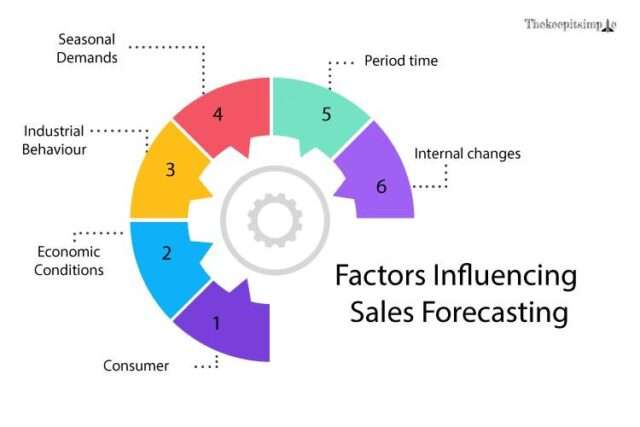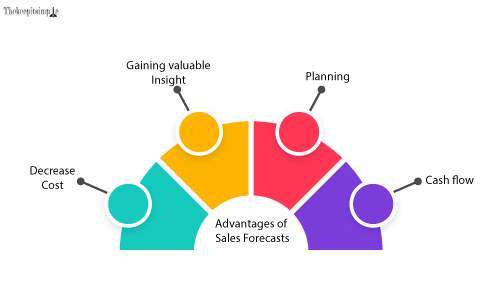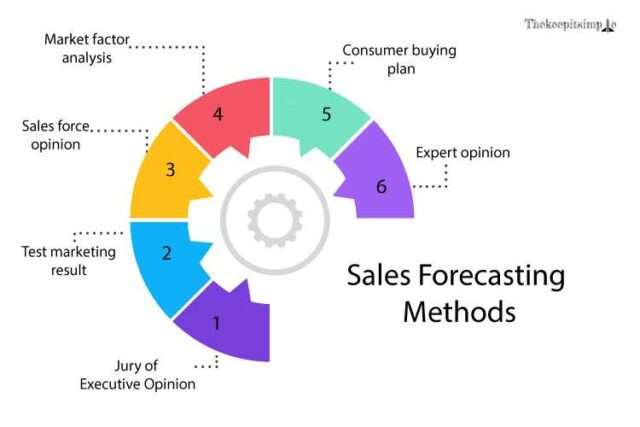Meaning of Sales Forecasts
Sales forecasts definition is termed as the business exercise to predict or plan the future sales revenue whether weekly, monthly, quarterly or yearly likely to be earned. Sales forecasts are determined by industry trends, the status of the current sales pipeline and historical data.
Estimates the number of products that will be sold at a particular price within a planned future period in a specific market. The concept is, however, different from sales goal-setting. Sales goal considers what a company wants to happen while forecasting explains what will happen or how the market will react despite whatever the goal is aimed at.

The company can make advanced arrangement of production means like machinery, labour and materials in sufficient quantity using sales forecasts definition. So, An absence of this can result in the random working of business putting a large amount of capital at risk invested.
What are the factors influencing sales forecasts?
The major factors influencing sales forecasting decisions can be discussed as follows:

Consumer
Forecasting sales is determined by the type and nature of customers around the market. Moreover, The demand for products gets influenced by the composition of population size through fashion trends, sex, age, social groups etc. So, The mentioned factors affect the decision of the forecaster which needs to be considered.
Economic conditions
Economic trends like inflation or deflation affect the business adversely or favourably. Therefore, the sales forecasts carry out accurately if economic, general and political trends are priorly known.
Industrial behaviour
The marketing behaviour of a business is greatly affected by the firms operating within the same industry. As a result, the forecaster has to look over the policy, pricing, technological improvements etc of the competitors.
Seasonal demands
To ensure accuracy, a business must check the seasonal demands of the products which may raise revenue significantly.
Period time
The time for which the sales forecasts are predicted is also affected by decision-making. So, This explains the data used for making estimations should be collected based on long, medium or short-run forecasts.
Internal changes
Future sales get influenced by variations in product quality, advertisement policy etc for which the effect of these factors on sales volume must be evaluated.
Objectives of Sales Forecasting
The objectives of the sales forecasting approach can be clearly understood from the following explanation:
- Firstly, the objectives ofForecasting sales describe the basis for the sales budget, production budget, natural budget etc.
- Sales forecast aids in determining the production volumes by arranging the facilities like equipment, capital, space, manpower etc.
- Forecasting aims or facilitates in right decision-making by delivering relevant information.
- Its focus is on the commitment level to the sales department of the company that needs to be achieved within the specified period.
- Accurate sales forecasting facilitates the planning of schedules related to activities.
- Sales forecasting focuses on guiding the different functional activities regarding the accomplishment of pre-established goals.
- Sales forecast helps to show what kind of investment the business can generate for potential investors rather than present value typically based on assets.
- Lastly, the objectives of sales forecasting determine the decisions for variations in product mix or product hierarchy example and plant expansion or whether diversion of resources for producing products.
Advantages of Sales Forecasts
Following are a few advantages of sales forecasts:

Decrease cost
By accurately anticipating the demand for required products by customers, a forecast enables a company to decrease its cost. So, The excess inventory level decreases if the business focuses on consumer desires which will lead to a rise in profitability.
Gaining valuable insight
Analyzing past and real-time data provides insight into business with the help of sales forecasts which gives the opportunity in making adjustments and corrections.
Planning
A reliable forecast guides businesses to take advantage of future changes and make decisions. Since uncertainty leads to obstruction in the expansion and growth of business whereas proper planning serves as good ideas for upcoming revenues.
Cash flow
Guiding by sales forecasts definition facilitates the company to maintain an optimum cash flow every time. When business is aware of the surplus or shrinks in funds, they plan accordingly.
Importance of Sales Forecasting
The importance of sales forecasting depicts an important concern for manufacturing units especially. Therefore, the following points discuss the usefulness of sales forecasts definition commonly studied:
- To overcome the anticipated supply, the temporary demand can be met by adjusting the supply and demand of products using sales forecasts.
- It leads to planning since the requirements of production activities depend on sales volume estimated in advance.
- In seasonal changes, inventory control is beneficial by avoiding the lack of understocking or overstocking.
- Lastly, the sales forecast facilitates the production, marketing and other functions to achieve their respective targets.
- It facilitates in deciding policies and the extent of advertising programmes.
- The sales forecast depicts a commitment concerning the sales department which must be achieved in a specified time.
- It helps the company to form a budget for the activities for both the short and long run
- The importance of Sales forecasting is reflected in the time of investors who look at the excess value projected sales rather than the present value.
- The seasonal demands are predicted with the help of sales forecast due to which the excess inventory can be ignored and present profit opportunity can be redeemed.
- Allocation and reallocation of sales market areas are facilitated.
- The importance of sales forecasting is however determined by the planning process and the step to make schedules for upcoming events.
Types of Sales forecasting
There are majorly two kinds or types of sales forecasting explained below:
Short-term Forecasting Long-term Forecasting
Short Term Forecasting
As the name suggests, this kind of forecasting sales is carried out for a shorter period. So, The period can vary from a month to a year depending upon the kind or nature of the product. Generally, it accounts for one year but may reduce due to market demand fluctuations.
Purpose
- Material requirement planning: By estimating the future demand, the availability of the right quality and quantity of materials can be ensured.
- Production policy: Production policy can be framed with the guidance of sales forecast to avoid overstocking or understocking.
- Equipment: The decision related to the requirement of new technology or tools considering the existing capacity and capability of existing equipment can be taken.
- Inventory control to ensure minimum or optimum carrying cost
- Finance arrangements related to machines, raw materials etc can be predicted.
- Manpower recruitment on a full-time or part-time basis
Long term forecasting
Sales forecasts that cover considerable time like 5,10 or 20 years are termed long-term forecasting (types of sales forecasting). The period, however, depends upon the type of product or nature of business, the company is engaged in manufacturing.
The industries like paper mills, steel plants etc where investment in infrastructure is high, long-term forecasting is applied.
Purposes
- Long-term financial requirements for various needs
- Planning for the new unit, diversification of various lines of production, expansion of existing units or shutting down the existing ones depending upon the demand.
- Meet the requirement of manpower by training the personnel that are required of desired expertise in future.
Sales forecasting methods
The sales forecasting methods approach vary from firm to firm. So, A firm can be a manufacturing or distributing concern. Therefore, the following are sales forecasting methods used by them:

Jury of executive opinion
The oldest sales forecasting method is where one or more executives who have good knowledge and experience of the market factors estimate the expected sales. So, The executives become responsible for figuring out the values through their experiences where all internal and external factors are taken into consideration.
Test marketing result
Under this method, the products are oriented in a limited, geographical area where the results are studied. Therefore, taking the results as a base, a sales forecasts definition is made. As a result, the test conducted is termed a sample or pre-test to analyse the market response.
Sales force opinion
Here, the intermediaries or salesmen estimate or predict sales in their respective zones for a given period. So, Salesforce remains in close touch with consumers with good knowledge to guide them about the future demand trend.
Market factor analysis
A business’s sales can depend on the behaviour of certain market factors. Therefore, by studying these behaviours, sales forecasts definition is made. Correlation can be one statistical analysis to understand the relationship between the two variables. Similarly, we have regression analysis that predicts the unknown value of one variable with the help of another.
Consumer buying plan
Under this method, Consumer buying nature is studied as a source of information under a given set of conditions during a specified period. Generally used for forecasting industrial goods or few customers market. Buyer behaviour fluctuates due to which the face-to-face or survey method conducts.
Expert opinion
Many consultancy agencies entered into the sales field where they have specialized experts in the respective field like trade associations, dealers etc. Also, They may hold readymade statistical data by conducting market research. As a result, companies take help and analyse for sound sales forecast.
Sales Forecast Example
Reading about the concept is just sometimes not useful until reviewed by examples. Therefore below are a few hypothetical examples quoted to know sales forecasts work:
Sales forecast Example 1, Forecasting based on historical data
XYZ is a company with recurring revenue of $150,000 per month and the sales revenue grew by 12% every month over the last 12 months. Over the same period, the company’s churn has been 1% pm.
Solution: Therefore, the month’s revenue is multiplied by expected growth while the expected churn is deducted
(150,000 x 1.12) – (150,000 x 0.01) = $166,500
As a result, the forecasted revenue for next month will be $166,500.
Sales forecast Example 2, Forecasting based on multiple variables and lead scores
Suppose an individual has set up a CRM analytic where the leads are grouped into 3 teams. They reflect the chances of an opportunity to close. Next, he finds companies with greater than(more likely to close) and less than 50 employees (close at a lower rate).
Therefore, there can be 6 opportunities with different combinations that can be forecasted. (Average sales price = $4000)
| Lead score | Close rate | Close rate | Company size(0-50) | Company size(51-100) |
| 0-50 | 51-100 | |||
| A | 25% | 50% | $1000 | $2000 |
| B | 12.5% | 25% | $500 | $1000 |
| C | 2.50% | 3.80% | $100 | $150 |
Conclusion of sales forecasts definition
Sales forecasts definition explains it as an indicator of what will likely happen in a specified time frame within a particular field. Also, The basic objective is correct decision-making along with the importance to guide the business. However, to help the company there are various sales forecasting methods used according to the nature of business by the firms.
Frequently Asked Questions (FAQs)
What is sales forecast definition?
Definition of a sales forecast is termed as the business exercise to predict or plan the future sales revenue whether weekly, monthly, quarterly or yearly likely to be earned. Sales forecasts are determined by industry trends, the status of the current sales pipeline and historical data.
What is the forecasting sales formula?
=FORECAST(x, known_y’s, known_x’s)
The FORECAST function uses the following arguments: X (required argument) – This is a numeric x-value for which we want to forecast a new y-value. Known_y’s (required argument) – The dependent array or range of data.
What is sales forecasting and its importance?
Sales forecasting allows companies to efficiently allocate resources for future growth and manage its cash flow. Sales forecasting also helps businesses to estimate their costs and revenue accurately based on which they are able to predict their short-term and long-term performance.
What is the process of forecasting?
Forecasting is the process of making predictions based on past and present data. Later these can be compared (resolved) against what happens. For example, a company might estimate their revenue in the next year, and then compare it against the actual results.